2017 National AOD Award Winners
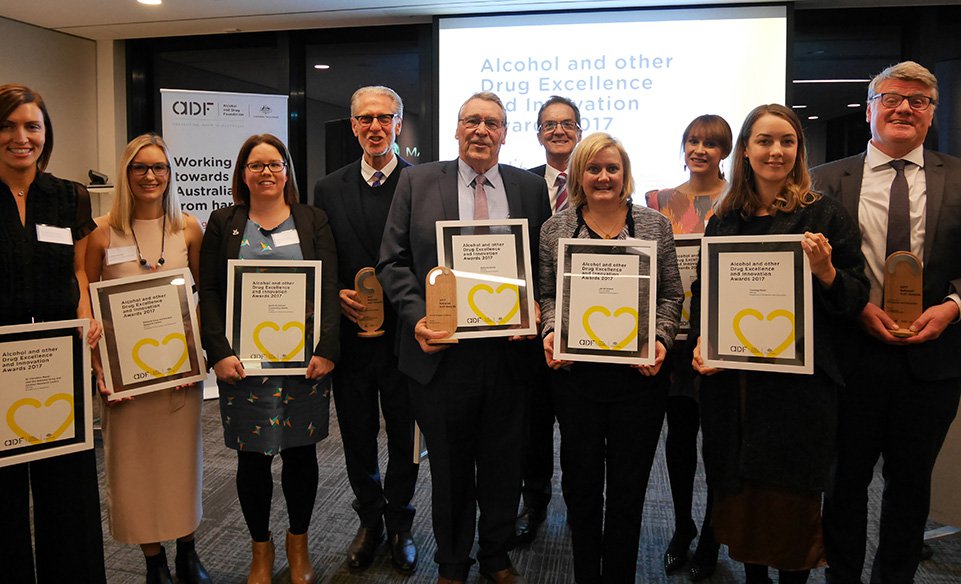
Prime Minister’s Award
The Prime Minister’s Award recognises individuals who have made a significant commitment and contribution to reducing the impact and negative effects of drug and alcohol use.
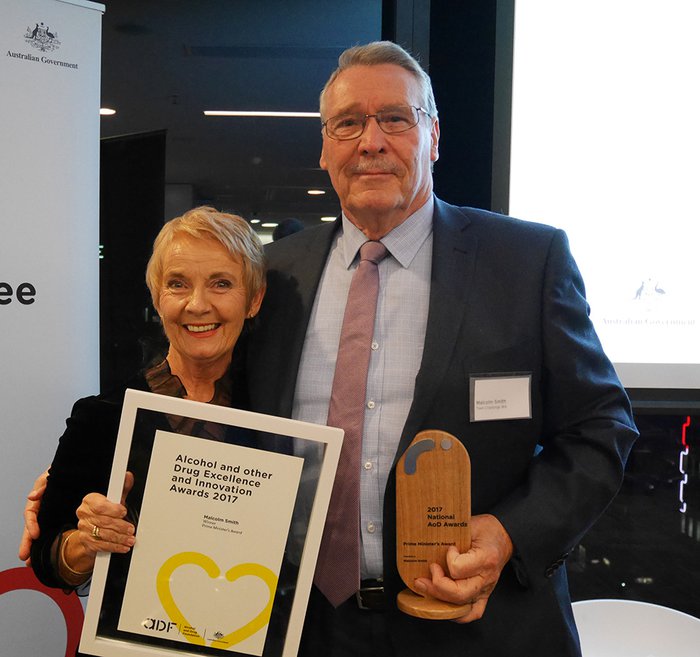
Winner
The winner in this category was Malcolm Smith. Malcolm is the Executive Director at Teen Challenge WA and has been helping the youth of Australia with alcohol and other drug issues for over 45 years. In 1985, Malcolm opened Teen Challenge WA and has spent the past 30 years dedicated to helping young people get back on their feet.
Prime Minister’s Award
Accepted by Teen Challenge WA
I was extremely surprised and honoured to receive this outstanding Award from the Alcohol and Drug Foundation and Prime Minister Turnbull.
I am grateful for the recognition of the work that we have accomplished through the years helping young people with drug and alcohol addictions in King's Cross, Sydney and then Perth, WA.
I have been greatly assisted by my wife, Marjorie - who also attended the ceremony - in establishing Teen Challenge in WA and seeing it grow through the 33 years to the entity it is today.
Although it was pointed out that this Award is an individual one, in reality it is always a team effort and I am grateful to all the staff who have helped build Teen Challenge through the many years to the outstanding drug prevention and treatment program it is today.
Our real battle is with the drug terrorists, who are attempting to radicalise our children to believe that drugs will solve all of life's problems for them. Because of this we still have unfinished business to attend to and we will not neglect it.
Prevention & Education
This award recognises programs, policies, and resources that make a significant contribution in preventing drug use and drug-related harm. Education plays a key role in preventing alcohol and other drug problems
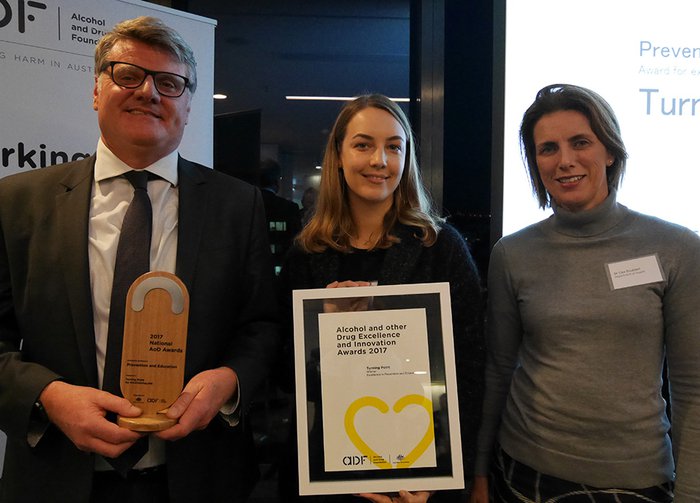
Winners
Turning Point was awarded Excellence in this category for their program, MAKINGtheLINK. MAKINGtheLINK is a unique school-based health promotion program that teaches adolescents how to identify mental health and substance use problems amongst their peers, and overcome barriers to accessing professional help.
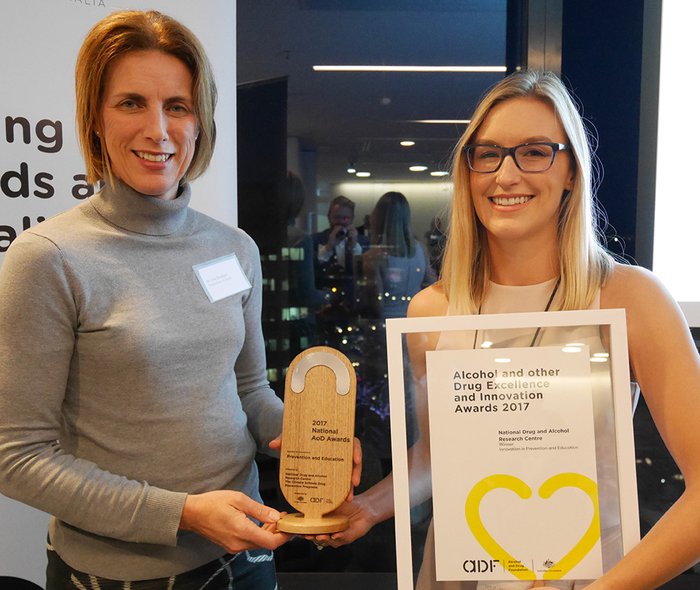
The National Drug and Alcohol Research Centre was awarded Innovation in this category for the Climate Schools program. The Climate Schools programs are innovative, online, universal school-based programs that aim to prevent the use of Australia's most commonly used licit and illicit drugs - alcohol, cannabis and psychostimulants.
Prevention and Education (Excellence)
Accepted by Anthony Denham and Emma Sandral
We are thrilled to accept this award in recognition of the work of our MAKINGtheLINK program.
MAKINGtheLINK is a school based health education program that provides teachers with training and resources to teach young people how to support their friends in seeking help.
The program is informed by current research, and has been evaluated as part of a randomised control trial that confirmed the effectiveness of the program.
Students feedback included: “I learned so much about alcohol and drugs and where to get help"
Teachers feedback on the program included that: “The sessions addressed a real need that is not covered elsewhere.”
Thanks to the many people that have worked on the program over many years including:
Dan Lubman
Bonnie Berridge
Lisa McKay Brown
Fiona Blee
Ali Cheetham
Emma Sandral
Nyssa Ferguson
Anna Guthrie
Laura Abbey
And thank you to all of the students and staff who have participated in the program.
Turning Point is a national addiction treatment centre, dedicated to providing high quality, evidence-based treatment to people adversely affected by alcohol, drugs and gambling, integrated with world-leading research and education. www.turningpoint.org.au
Prevention and Education (Innovation)
Accepted by Louise Birrell
Climate Schools was developed by the National Drug and Alcohol Research Centre (NDARC), School of Psychiatry, and the NHMRC Centre of Research Excellence in Mental Health and Substance Use at the University of New South Wales.
The development and evaluation of the Climate Schools programs was made possible through a number of grants from the NHMRC, Australian Government Department of Health, The Alcohol Education and Rehabilitation Foundation, and the Australian Research Council awarded to A/Prof Nicola Newton, Professor Maree Teesson, Dr Laura Vogl and Professor Gavin Andrews. The following researchers made critical contributions to the development and evaluation of Climate Schools; Dr Katrina Champion, A/Prof Tim Slade, Dr Emma Barrett, Dr Cath Chapman, Louise Birrell, Brad Shaw and Dr Lexine Stapinski.
Climate Schools would not have been possible without the expertise of a large number of health and physical education teachers and health experts who have spent many hours vetting the initial cartoon scripts, providing class activity ideas and suggesting ways to make the modules accurate, effective and easy to implement in the class room. We are also grateful to the many young people who helped to further vet the scripts and ensure that scenarios and language were appropriate and believable for Year 8 students. This project would not have been possible without the amazing cartoons from Big Q productions. We are also incredibly grateful to Greg Stephenson and the team at Netfront Pty Ltd for programming and web development.
Finally, I would like to acknowledge all the wonderful researchers at the University of New South Wales who have worked on Climate Schools over the past 10 years. Without their tireless efforts, we would not have been able to reach over 14,000 students and empower young people to make informed choices.
Treatment & Support
The Treatment and Support category recognises a program or service that has made a significant contribution to treatment and support efforts that have been designed to assist those Australians who have been impacted by alcohol and other drug use. Nominations in this category must be based on established scientific evidence, designed to address a current gap in knowledge and/or service delivery and had to go above and beyond business as usual.
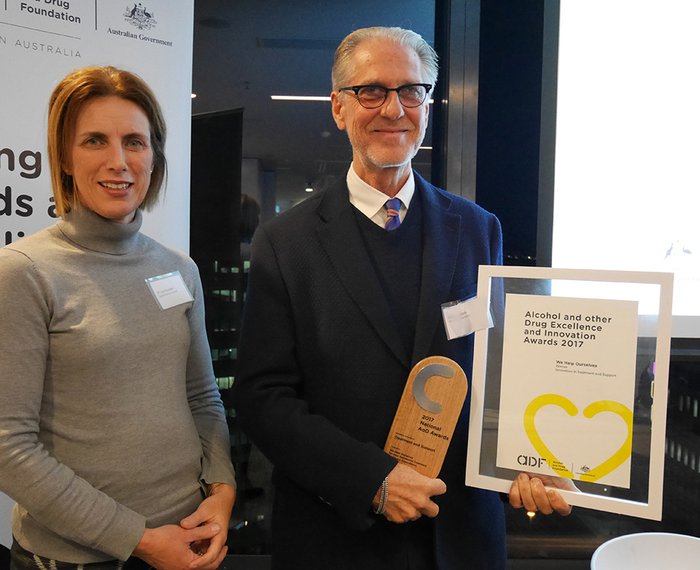
Winner
We Help Ourselves was awarded Innovation in this category for their Residential Opioid Substitution Treatment service that treats the complex needs of people receiving opioid substitution therapies. We Help Ourselves provides a quality service that gives clients the opportunity to stabilise within a supportive environment and to begin recovery with individualised and streamlined community-based treatment programs.
Treatment and Support
Accepted by Garth Popple
It’s always such a great honour to receive awards and especially in this case to receive a prestigious National Award.
As I am sure you all know, winning such an award is the result of the hard work of many, and often over a long period of time – I am just the lucky one that gets to represent all our hard work and enjoy the celebration tonight.
There are too many people to thank individually so I want to simply thank all the We Help Ourselves (WHOS) staff who made our innovative RTOD modified therapeutic community service not just a reality but the success it has become – our thanks also go to the Federal Department of Health that had the courage and foresight to fund this new residential program. Our success also depended on the support of the local health officials, local medical practitioners and the local community. Support from the NSW Ministry of Health was also important as we needed to become the first NGO to receive a pharmacotherapy dispensing license to operate successfully.
I want to specifically thank the WHOS Board that continue to remain so supportive of WHOS efforts to provide the best service services possible for our residents (clients) today and in the future.
Of course, I also need to thank the many RTOD residents that over the years have shown that if given the right option they will grab the opportunity to regain control of their lives.
In February 2009 when WHOS opened a residential stabilisation program (WHOS RTOD) for individuals on opioid pharmacotherapy treatment, the first of its kind in Australia, there were those that doubted that such a service could operate alongside residential centres with drug free goals. The results prove otherwise. WHOS RTOD stabilisation service is a modified therapeutic community that specifically aims to provide a quality service that enables opioid maintained clients the opportunity to stabilise within a supportive environment and to foster health gains within an individualised and streamlined community-based treatment program. This service is complemented by incorporating the concepts of harm minimisation from substance misuse including the provision of education to minimise the spread of communicable diseases including HIV/AIDS.
It is so pleasing to see the results we are achieving as the types of clients presenting for treatment at WHOS RTOD often have complex needs and are functioning poorly socially and physically, as well as dealing with many mental health issues, at the time of admission. Despite these problems, we still achieve a high rate of retention and treatment completion with our residents. This is a measure of success we are very proud of achieving as we know that residents that spend more time in WHOS RTOD have a greater chance of achieving the goals they have set for themselves.
Finally, I want to say that everyone always supports innovation, which is easy to do when it’s successful. However, such success is often built upon the efforts of others that have tried and failed. It is because of this, that I hope Australia and its funding bodies never lose their commitment to supporting innovation in the drug and alcohol field, even if at times it may not be as successful as hoped, as this really is the true test of leadership and a commitment to excellence.
Reduction of Harm
The Reduction of Harm category recognises programs, policies and resources that have made a significant contribution to harm reduction efforts. Nominations within this category were judged on whether or not they were based on an identified need, included an appropriate level on communication and demonstrated a clear reduction of harm.
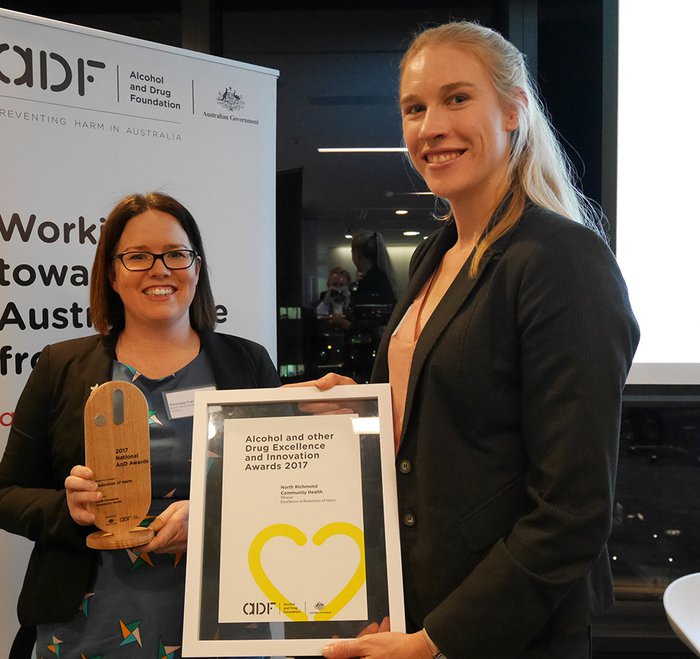
Winner
North Richmond Community Health was awarded Excellence in this category for their Alcohol and Other Drug Program which provides harm reduction services to people who inject drugs in Richmond, an area well known in Melbourne for public drug dealing and injecting. Services are provided to approximately 200 people per day. Throughout the past year North Richmond Community Health have attended 55 overdoses and have distributed an average 70,000 syringes per month to reduce the prevalence of HIV and hepatitis C which are higher than average among people who inject drugs in Victoria.
Research
The Research category recognises the importance of research within the AOD sector and its relevance and benefit to the community as a whole. Nominations in this category must add practical value to alcohol and other drug practices, be of sound design and method, meet the ethical standards for research practice and be effectively disseminated.
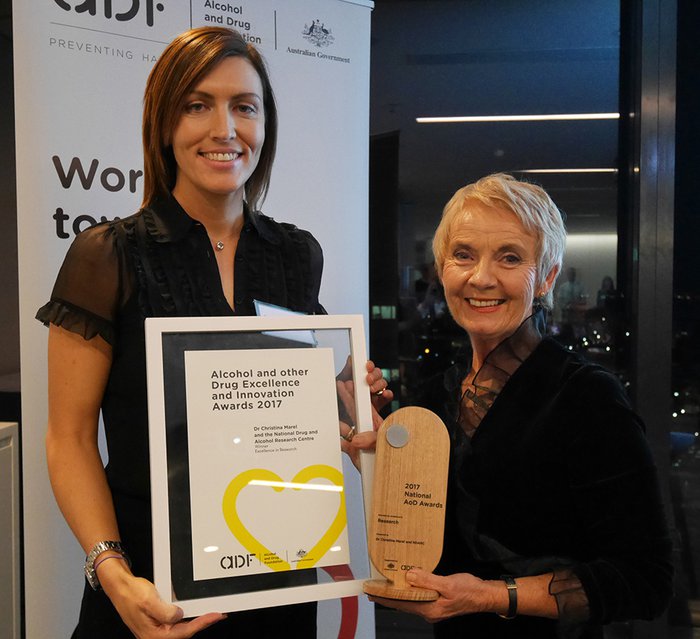
Winner
The winner in this category was Dr Christina Marel and the National Drug and Alcohol Research Centre. Dr Christina Marel was instrumental in developing the 2016 National Comorbidity Guidelines to assist AOD workers who are frequently required to manage complex psychiatric symptoms.
Research
Accepted by Dr Christina Marel
Firstly, I’d like to sincerely thank the Alcohol and Drug Foundation for this award. My colleagues nominated me for this award without my knowledge, which, in itself, has been a huge honour and a wonderful surprise, and winning is really incredible. Thank you to the Australian Government Department of Health for funding the development and distribution of the National Comorbidity Guidelines, and also to the Society of Mental Health Research for providing me with an early career researcher fellowship that allowed me to undertake this work.
I’d like to acknowledge and thank my co-authors and co-developers of the online training program, and a special thank you to Maree Teesson, Katherine Mills and Cath Chapman for mentoring me and providing invaluable support and guidance, without which, none of this work could have been done. And most importantly, I’d like to thank the clinicians, carers, consumers, academics, policy makers and AOD workers who so generously contributed their knowledge and expertise to the development of this resource, ensuring that it would be clinically relevant and useful.
Media Reporting
The Media Reporting category recognises the important role the media plays in shaping and informing community knowledge and perceptions around alcohol and other drug issues. Nominations in this category were required to illustrate how the media article had informed and shaped community knowledge and perceptions of alcohol and drug issues.
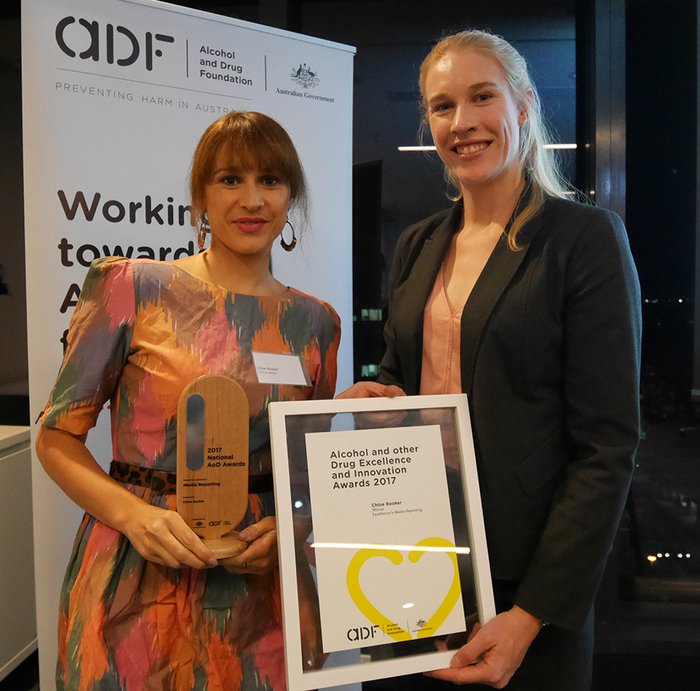
Winner
Chloe Booker was awarded Excellence in this category for her articles published from 2014 to 2017. Her reporting brought attention to the increasing overdose rates, lack of public alcohol and other drug treatment options and the stigma associated with people suffering from alcohol and other drug related harms in Victoria. Chloe’s dedication to the truth is inspiring.
First Australians Award
The First Australians Award recognises an individual or community as having made a significant and/or meaningful commitment and contribution to reducing the impact and negative effects of alcohol and other drug use in Aboriginal and or Torres Strait Islander communities.
Winner
Kristie Harrison from the University of Sydney was the recipient of the First Australians’ Award in 2017. Kristie is a Wiradjuri woman who has focused her talents and energies into supporting the Aboriginal community within the alcohol and other drug field. Kristie is a strong leader, with the ability to organise and motivate people to work towards the same goal.
National Honour Roll
The National Honour Roll is for individuals who have made a significant contribution, over a considerable time period, to the alcohol and other drug field. This is our opportunity to acknowledge and publicly recognise the exceptional work which done by people who work tirelessly in this sector.
Winners
Professor Steve Allsop joined the National Honour Roll in 2017 because of his 40-year contribution to the AOD sector and his commitment to preventing harm from alcohol and other drugs. His contribution has benefited researchers, service users, providers and policymakers across Australia.
Colleen Blum also joined the National Honour Roll in 2017. Colleen has worked within the health sector for nearly five decades and in 2004 she began working within the drug and alcohol sector. Colleen is passionate about caring for patients with alcohol and other drug problems and currently works at Damascus Health Services in Brisbane, a treatment facility for people who are addressing issues related to alcohol and other drugs.
National Honour Roll
Professor Steve Allsop
I started out working as a 17 year old volunteer in an overdose prevention and drug outreach program in 1972. I didn’t expect then that this would become my career. Like many young people at that time I was interested in and touched by drug use and concerned at how it impacted on some people’s lives. During a stint of clinical training focusing on young people in Scotland, yet again I was impressed by the significant role alcohol, in particular, had on the cases I saw. My first conference, on alcohol and young people, sealed the deal – it was an incredibly dynamic field, and in the 1980’s nearly every edition of the key journals carried a significant new advance in the debates and thinking. I have worked in not-for-profit services, academic institutes, and government services involved in clinical research in psychiatric hospitals, policy development, workforce development, service delivery and contributed to debate about drug policy. It has been a privilege because of the incredible opportunity and diversity of roles I have had the good fortune to embrace. But most importantly it is the humanity of the field that has kept me engaged. I never fail to be energized by the importance of attempting to make a difference to people affected by alcohol and other drug use – either in trying to contribute to the evidence about how we can work more effectively or in contributing to the debate about the need to address the stigma and discrimination that impair our ability to provide a more caring and effective response to the challenges that constantly arise. After all these years I still care – and I hope I always will.